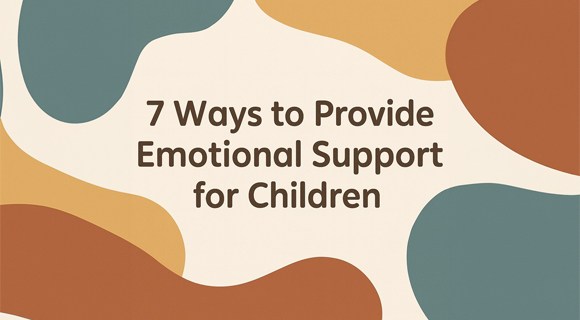
Raising emotionally healthy children is one of the most important responsibilities for parents and carers. Childhood is full of development, learning, but it can also come with stress, anxiety and emotional challenges. In raise behavior, we help children and adolescents navigate these challenges through compassionate medical and general psychiatric care. Here are seven practical methods to provide emotional support for children and help them bloom.
1. Encourage Open Communication
Children must feel safe to express their thoughts and feelings without fear of consequences. Open communication allows them to share worries, frustrations and happiness, and share self -confidence and emotional intelligence. In Raise Behaviour Health, therapists work with families to create the environment where children hear and understand.
2. Validate Their Emotions
It is important to accept the child's feelings. Although their reactions seem less or irrational, validation of their feelings suggests that their experiences are real and important. This practice promotes emotional flexibility and teaches children that it is okay to experience and express feelings. Therapists about climbing Raise Behavior Health recognise and validate emotions in a healthy way for children and parents, giving children the confidence to treat their feelings creatively.
3. Build Consistent Routines
Consistency and purity help children feel safe. Daily routine for food, sleep, school and play provides composition, reducing stress and uncertainty. Constant routine also learns responsibility and time management. Behavioral health, the purpose of the families is to create a structured environment that corresponds to the needs of each child. This approach is especially beneficial for children who are anxiety, ADHD or other emotional and behavioral challenges, and helps them feel safe and land.
4. Teach Healthy Coping Skills
Life is full of challenges, and children benefit from methods of learning to cope with stress in positive ways. Healthy coping skills include deep breathing, mindfulness, problem solving and physical activity. To improve behavioral health, therapists integrate therapeutic strategies into sessions and help children identify and respond effectively. These skills not only solve the current challenges, but also prepare children for future emotional conditions, giving them the equipment to navigate life with confidence.
5. Promote Positive Self-Esteem
The self for a child shapes their self -confidence, decision -making and flexibility. Parents can promote positive self -confidence by celebrating performance, encouraging strength, encouraging strength and rose for efforts just instead of results. By strengthening practical health, medical intervention focuses on creating self -values ??through structured activities, counseling and guidance. When children feel competent and valuable, they are better equipped to handle challenges and maintain emotional balance.
6. Practice Mindfulness and Gratitude Together
Mindfulness and gratitude practice teach children to slow down, reflect and appreciate the current moment. Activities such as attentive breeding, ironing or family gratitude exercises reduce anxiety and improve emotional regulation. Behavior with families improves health work to include mindfulness and gratitude in the daily routine. This practice promotes peace, strengthens parents' relationships and helps children develop awareness of their feelings in the aid environment.
7. Seek Professional Guidance When Needed
Sometimes children face emotional challenges that require professional support. Therapy provides a safe place to develop a strategy for detecting duplication skills learning and dealing with stress or behavioral problems. In Raise Behaviour Health, we offer special therapy for children and adolescents, which addresses a wide range of emotional and practical needs. Early intervention can prevent minor conflicts from causing major problems and ensuring that children receive guidance they need to flourish.
Creating a Supportive Environment
Emotional support for children, health is a continuous process that includes patience, sympathy and stability. By encouraging communication, validating emotions, giving structure, teaching coping skills, promoting self -confidence, practicing mindfulness and taking professional help when needed, parents can create an environment where children feel safe, understanding and strong.
In Raise Behaviour Health, our mission is to raise mentally healthy families by providing evidence -based medical and general care that fits the unique needs of each child. Whether your child has to deal with anxiety, behavioral challenges or everyday stress, our team is dedicated to the families to guide the strong emotional health and flexibility.
If you want to learn more about therapeutic programs for children and adolescents, contact Raise Behaviour Health today, make an appointment, and take the first step toward the nutrition of the child's emotional well being.
FAQ’s
1. What is emotional support for children?
Emotional support for children involves dealing with emotions, developing flexibility and providing care, understanding and guidance to help navigate challenges effectively. This includes listening, validation of emotions and teaching in healthy coping strategies.
2. Why is emotional support important for children?
Children who continuously receive emotional support are more likely to develop trust, strong relationships and effective coping skills. This helps them to deal with stress, reduce anxiety and create a positive feeling.
3. How can parents provide emotional support for children at home?
Parents can encourage open communication, validate emotions, establish routines, learn coping skills, promote self -confidence and practice mindfulness together. When necessary, professional support in search of guidance increases.
4. How does Raise Behavioral Health help with emotional support for children?
Expanded behavioral health provides special medical programs that fit each child's emotional and practical needs. Our trained professionals provide tools, guidance and help to help children express emotions, make flexibility and flourish.




Comments